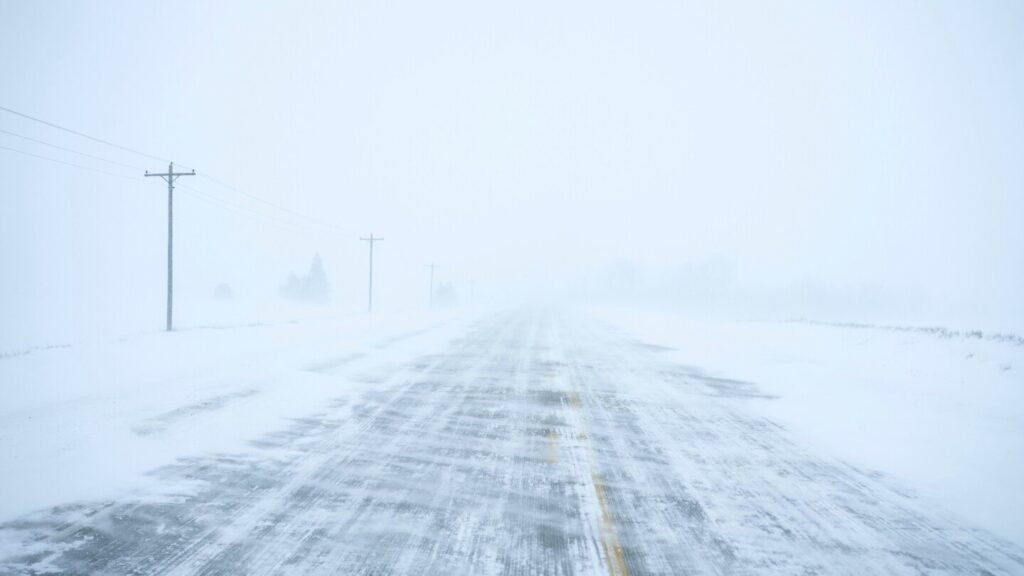ST. LOUIS (news agencies) — A massive winter storm swept the northern U.S. on Friday, with blinding snow in some places, freezing rain in others, and bitter cold temperatures with whipping winds across several states.
At least one death was suspected from the latest round of dangerous weather — a man was believed dead after an avalanche in the Idaho backcountry. Political leaders in Illinois implored Texas Gov. Greg Abbot to stop sending migrants to Chicago, which is on the verge of dangerous weather.
Heavy snow and strong winds made driving virtually impossible in parts of Iowa, so much so that Republican presidential hopefuls called off campaign events. “Black ice” from freezing rain caused wrecks and brought Kansas City, Missouri, to a standstill. Flight cancellations were common, including more than 1,000 at Chicago’s airports.
In Idaho, two men were rescued after being caught in the avalanche Thursday afternoon near the Montana border, but a third man was missing and presumed dead. The U.S. Air Force assisted in the search and rescue. Authorities weren’t sure what the men were doing in the area that had been under an avalanche danger warning for several days.
The Idaho avalanche came a day after the first U.S. avalanche death of the season was reported in California on Wednesday.
Republican candidates campaigning ahead of Monday’s Iowa caucuses were contending with a blizzard warning covering most of the state. Nikki Haley’s campaign canceled three Friday events and said it would be hosting “telephone town halls.” Ron DeSantis’ campaign postponed events in Marshaltown and Clear Lake.
The Iowa State Patrol posted photos of an icy wreck. “Please, don’t put yourself or others in danger,” the agency wrote. “The road conditions are extremely dangerous!”
Blizzard warnings were issued in some places, including southwestern Minnesota and the Green Bay area of Wisconsin. Forecasts for the Milwaukee area predicted heavy snow stretching into Saturday morning with wind gusts up to 40 mph (64 kph).
Snow wasn’t the only problem.
The cold was the biggest concern in the Dakotas. It was 11 degrees below zero F (minus 24 C) in Bismarck, North Dakota, on Friday morning, and forecasters warned the weekend will get even worse. It could reach 20 below F (minus 29 C) by early Sunday.
Chicago is expecting several inches of snow through the weekend, with wind chills well below zero. Advocates worried for the growing population of migrants sent up from the U.S.-Mexico border — more than 26,000 migrants have arrived since last year. By Friday, dozens were staying in eight parked “warming buses” to avoid sleeping outside while they await space in city-run shelters.
Angelo Travieso, a Venezuelan bused up from Texas, wore a light jacket and sandals with socks after sleeping on one of the buses.
“I slept sitting because there is almost no space left,” he said. “The buses are also small and you practically have to stay inside because of the heating, because it is deadly cold outside.”
Mayor Brandon Johnson said the city will suspend plans to enforce a 60-day cap on shelter stays for asylum seekers through at least Jan. 22 because of the cold snap. Meanwhile, Illinois Gov. J.B. Pritzker released a letter pleading with Abbott.
“As we grapple with the existing challenges of your ongoing manufactured crisis, the next few days are a threat to the families and children you are sending here,” Pritzker wrote. “I am pleading with you to at least pause these transports to save lives.”
Temperatures were below zero Fahrenheit across Montana on Friday morning with wind chills as low as minus 57 F (minus 49 C) in places along the eastern edge of the Rocky Mountains and in the central part of the state.
At the Double Cross Cattle Company, a ranch near Roberts, Montana, Tyson Ropp used an axe to chop through inches of ice covering a stock tank so that his bulls could drink water. Then, he used a feed truck to spread extra hay for his cows, a process he planned to repeat later Friday.
Temperatures were expected to drop overnight to minus 28 F (minus 33 C), so Ropp said he’d spread straw on the ground, somewhere out of the wind, for the cattle to rest and stay dry.
“It’s going to get pretty chilly tonight,” he said, “We’ve got a couple hidey holes they can get into and bed down and hunker down together and stay warm.”
Ropp shrugged off the cold.


